15, April 2024
Cardinal Robert Sarah says Western prelates have lost their nerve 0
An African cardinal widely seen as a conservative critic of Pope Francis, and styled by some as possible candidate for the papacy himself, has warned of what he described as a “practical atheism” taking hold within the Catholic Church.
Cardinal Robert Sarah of Guinea also repeated his criticism of Fiducia Supplicans, the recent Vatican document authorizing blessings of couples involved in same-sex unions, insisting that it’s not just traditional African culture but Catholic teaching itself which makes the document unacceptable.
Speaking to the episcopal conference of Cameroon, Cardinal Robert Sarah of Guinea, the Vatican’s former top official for liturgy, criticized Western bishops for their reluctance to oppose secular worldly values, accusing them of a failure of nerve.
“Many Western prelates are tetanized by the idea of opposing the world. They dream of being loved by the world; they’ve lost the desire to be a sign of contradiction,” said the 78-year-old Sarah.
Sarah told the Cameroonian bishops he believes “the Church of our time is experiencing the temptation of atheism. Not intellectual atheism, but that subtle and dangerous state of mind [of] fluid and practical atheism.”
“The latter is a dangerous disease, even if its initial symptoms seem benign,” he said.
According to Sarah, practical atheism is more insidious than its intellectual counterpart, as it does not declare itself openly but seeps into every aspect of contemporary culture, including ecclesiastical discourse.
He asserted that the Church and its leadership has been guilty of “accommodating, of complicity with this major lie that is fluid and practical atheism.”
“We pretend to be Christian believers and men of faith. We celebrate religious rites, but in fact we live as pagans and unbelievers,” Sarah said.
Sarah described “fluid and practical atheism” as a treacherous and elusive force. He compared it to being caught in a spider’s web, where efforts to escape only tighten its grip. This brand of atheism, he argues, is a masterful trap set by Satan himself.
The Church leader emphasized that this form of atheism preys on human frailties and on man’s tendencies to give in to its deceptions. He urged that within the Church, there should be no factions or self-proclaimed saviors, as such divisions play into the adversary’s hands.
“We don’t have to create parties in the Church; we don’t have to proclaim ourselves the saviors of this or that institution,” he said.
“But each of us can decide today: the lie of atheism will no longer pass through me; I no longer wish to renounce the light of faith; I no longer wish, out of convenience, laziness or conformism, to allow light and darkness to cohabit within me,” Sarah said.
“To maintain the spirit of faith,” he said, “is to reject anything that undermines it and to view the world solely through the lens of faith, holding steadfastly to God’s hand,” calling that the only path to true peace and kindness.
Sarah condemned the “bitterness and partisanship” that have plagued the Church, suggesting that these issues are symptomatic of a deeper spiritual crisis. He stressed that only a spirit of faith can foster genuine brotherly love and bring peace to a world ravaged by deceit and conflict.
The cleric also exhorted the episcopate in Africa to defend what he called the “unity of faith” in the face of Western distortions.
Referring to the October 2024 session of the ongoing Synod of Bishops on Synodality, Sarah praised the spirited defense African Church leaders have mounted of traditional doctrine and values.
“At the last Synod, the Church in Africa forcefully defended the dignity of the man and woman created by God. Her voice was ignored and scorned by those whose sole obsession is to please Western lobbies,” Sarah said.
“The Church in Africa will soon have to defend the truth of the priesthood and the unity of the faith. The Church in Africa is the voice of the poor, the simple and the small,” he said.
The cleric noted that while the African Church today plays a critical role in upholding the word of God, Western Christians seem to be misled by their wealth into a false sense of enlightenment and modernity.
Sarah highlighted the unique position of African bishops as guardians of the faith’s universality, standing against those, he said, who fragment the truth and promote a culture of relativism. He praised their role as messengers of divine truth, suggesting that God often chooses the seemingly weak and unpopular to confound the strong and well-regarded.
Sarah also commended the bishops of Cameroon for their opposition to Fiducia Supplicans, the recent Vatican document permitting blessings for same-sex couples and others in non-traditional relationships. Sarah called the Cameroonians’ decision not to implement it as a “bold and prophetic move” that upholds the unity of the Church and the truth of its teachings.
He criticized the notion that African bishops’ resistance to Fiducia Supplicans is rooted in traditional African culture, dismissing such claims as a form of intellectual neo-colonialism.
Instead, Sarah pointed to the Symposium of Episcopal Conference of Africa and Madagascar (SECAM)’s statement, which outlined theological and doctrinal reasons for not adopting such blessings in Africa, including previous declarations on homosexuality, the Catechism of the Catholic Church, Sacred Scriptures, and concerns about the language used in the Vatican document.
The President of the National Episcopal Conference of Cameroon, Archbishop Andrew Nkea Fuanya, told Crux that Sarah “is a great man of God, an icon of the Catholic Church in Africa and it’s a great opportunity that he is amongst us.”
“He has taught us to go into intimacy with God in silence, because there is so much noise in this world,” Nkea said.
Source: Crux

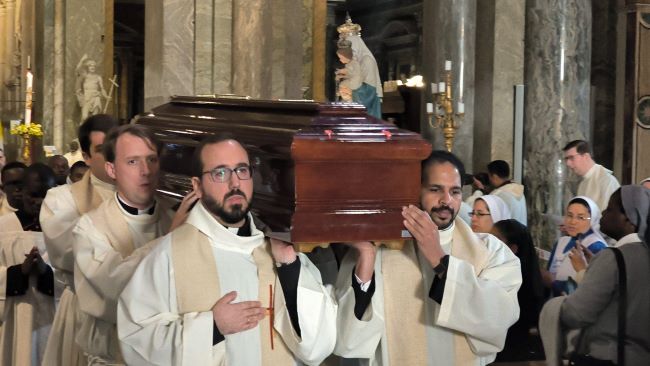
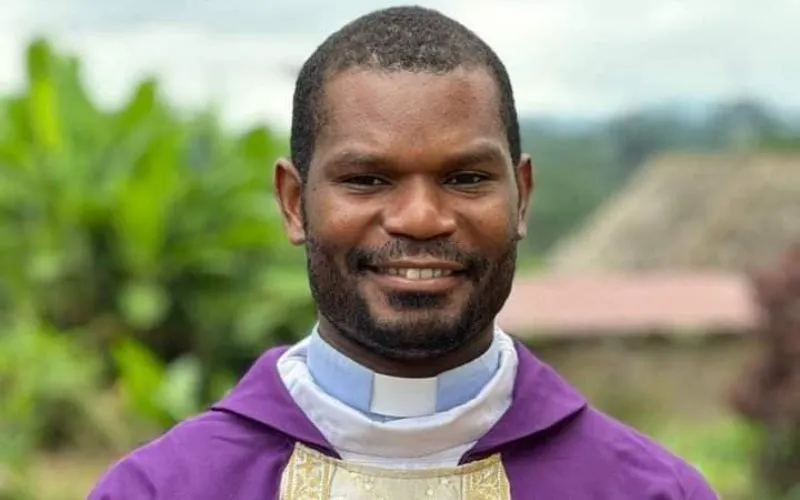
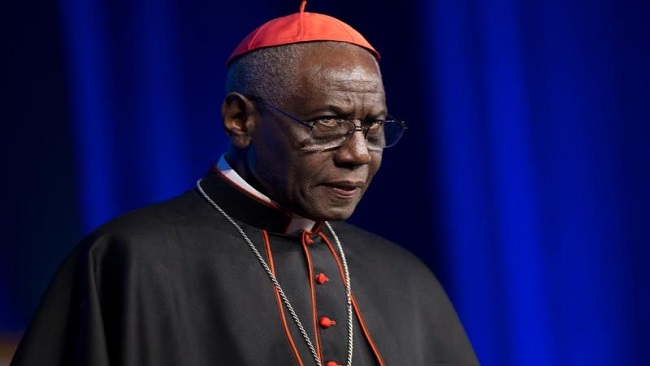
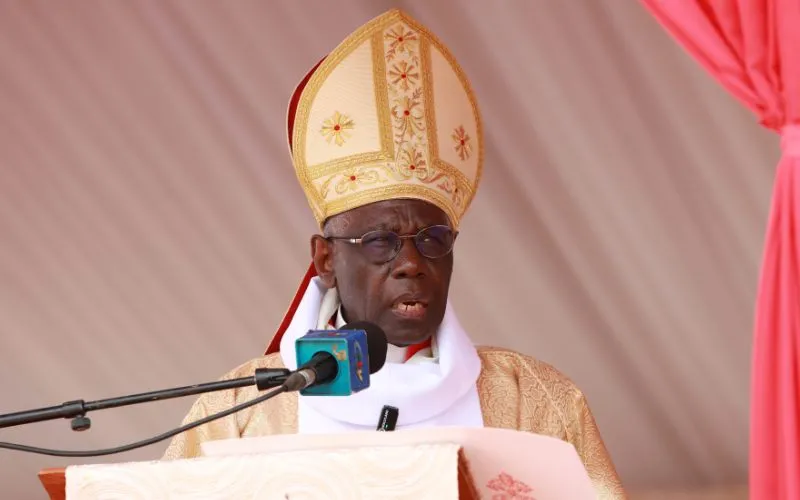 Credit: ACI Africa
Credit: ACI Africa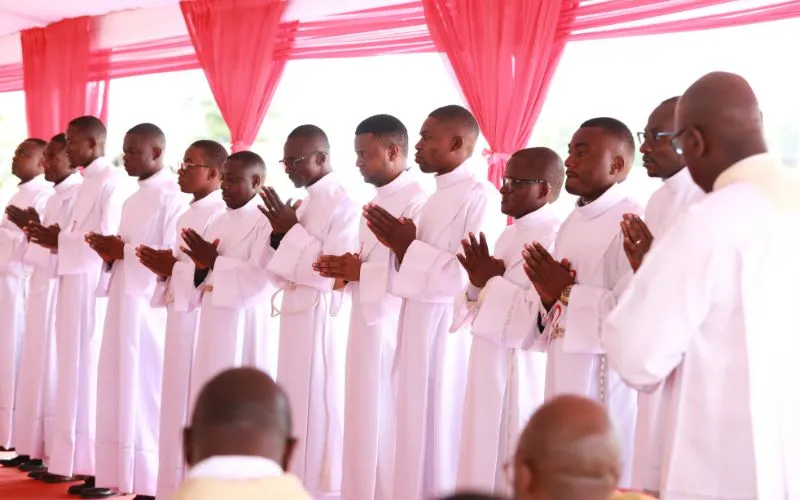 Credit: ACI Africa
Credit: ACI Africa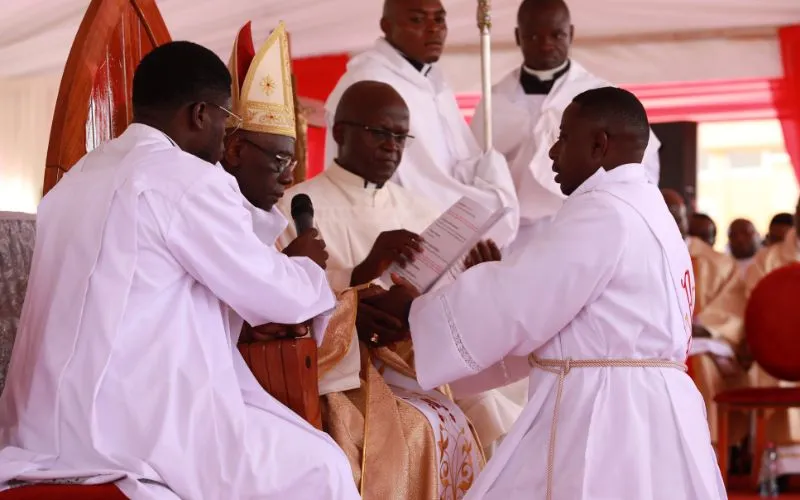 Credit: ACI Africa
Credit: ACI Africa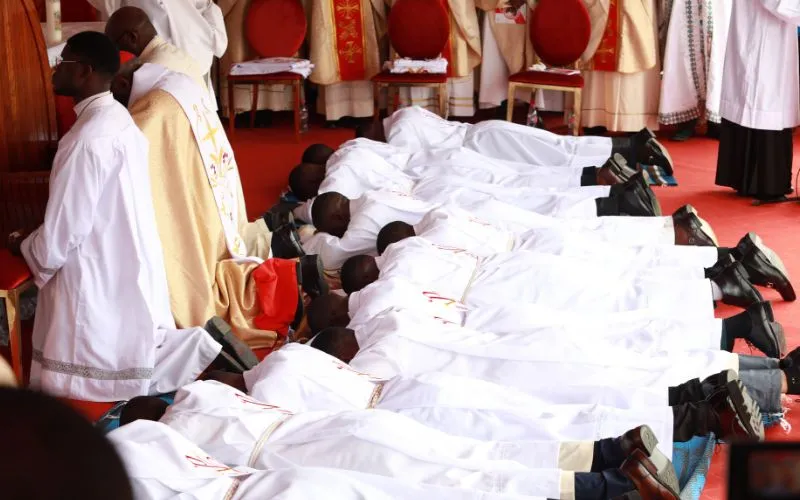 Credit: ACI Africa
Credit: ACI Africa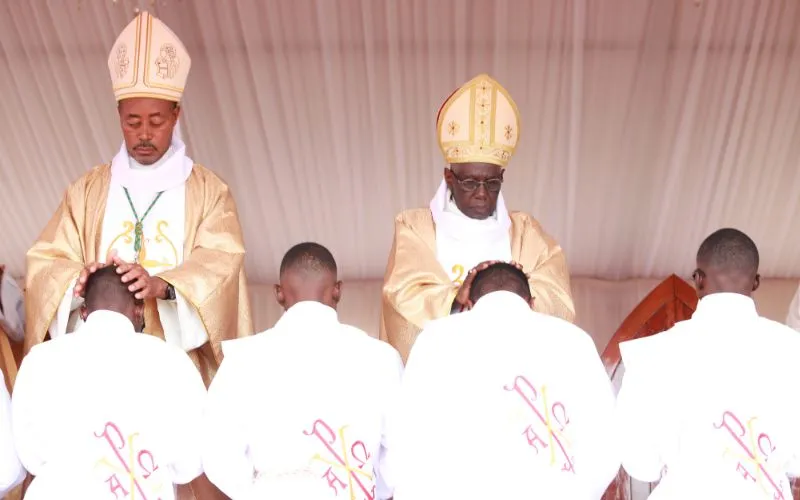 Credit: ACI Africa
Credit: ACI Africa
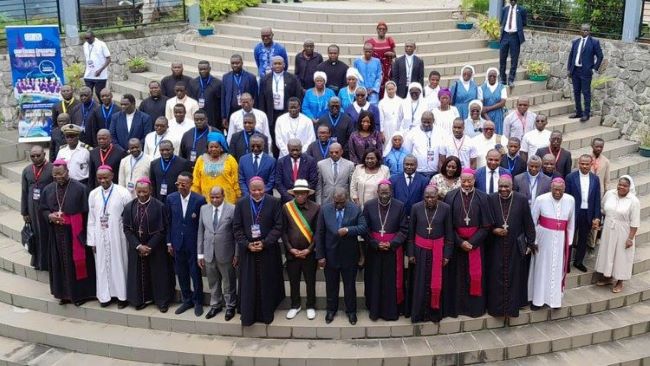
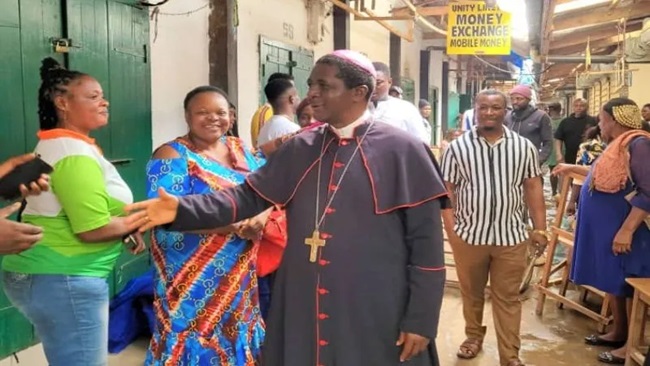

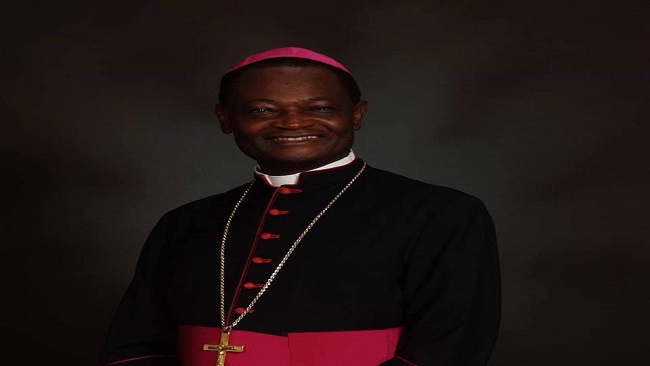
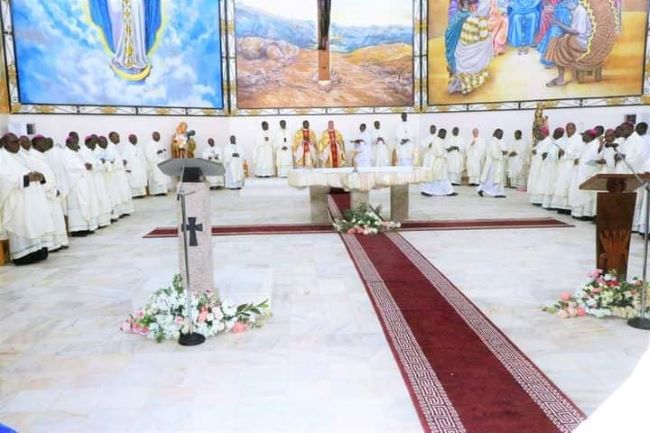
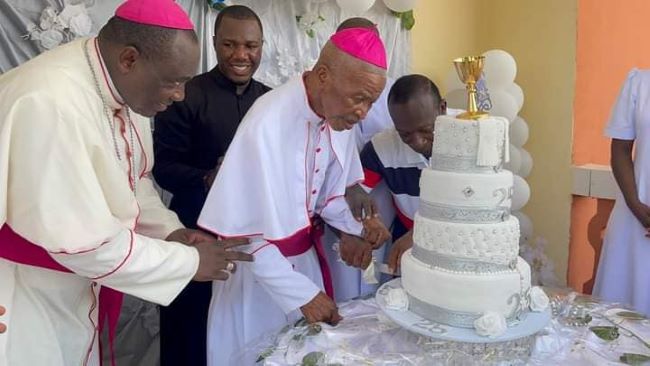











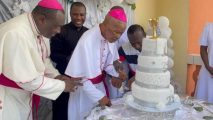
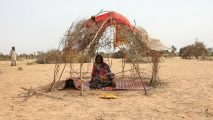



25, April 2024
Bishop Francis T. Lysinge @ 25! 0
Pastores dabo vobis, iuxtacor meum, the Lord says to the Prophet Jeremiah (Jer. 3:15) – I will give you shepherds after my own heart! Bishops are primarily, pastors, successors of the apostles. That is how the Catholic tradition understands them. And this process of self-understanding, of ecclesial maturation, has unfolded in the Church’s long history. At the First Vatican Council (1869-1870), in the Dogmatic Constitution on the Church, Pastor Aeternus, the Council taught the infallibility of the Bishop of Rome. It taught that the Bishop of Rome as Supreme Pontiff, when he teaches ex cathedra, that is, from the chair, meaning in his capacity as Pope, Successor to the Apostle Peter, what he teaches, pertaining to faith and morals, is solemnly binding on the universal church and Catholics are expected to give an assent of mind and heart to such a proclamation. The outbreak of the Franco-Prussian War (1870-1871) interrupted the Council and prematurely ended it. That left Catholicism with an unbridled monarchical papacy, in which the Bishop of Rome was left hanging alone, as it where, above the Church.
With the Second Vatican Council (1962-1965), the Bishops gathered in Council, as Successors of the Apostles, sought to do an ecclesial balancing act of the unfinished business of the First Vatican Council. In the Dogmatic Constitution on the Church, Lumen Gentium, and in the Decree Concerning the Pastoral Office of Bishops in the Church, Christus Dominus, the Bishops taught that as Successors of the Apostles, Bishops were not mere emissaries or ambassadors of the Pope. Pertaining to their local churches, they are proper pastors who, certainly, together with the Pope, sub et cum Petro, constitute an apostolic college charged with the governance of the universal Church. In this way, Vatican II enfleshed the monarchical character of governance of the Petrine ministry, with a collegial character of the Episcopate.
This is the body, the Episcopate, into which on April 21, 1999, Francis Teke Lysinge was called into, by the Grace of God and the Apostolic See. Born in Bokwango on December 28, 1938, to Albert Lysinge and Juliana JofiMbua, Francis Teke Lysinge is the second son in a family of four boys and three girls. His father was from Bokwango Village while his mother was from Buea Town. His father was a teacher in the Native Authority (NA) School of Muea and so eventually moved from Bokwango to Muea. His parents were Protestants, and so originally Bishop Lysinge was baptized in the Basel Mission Church Bimbia-Victoria where he started his Primary School in 1945 as Godwill Teke Lysinge (Agbaw-Ebai, 2013: Bishop Francis T. Lysinge, A Retrospective Legacy).
As a young man, Godwill Teke Lysinge, as he was then known, had gone to Sasse College, the Premier Secondary School in the then West Cameroon, to pursue the dreams of a brighter future, the aspiration of every young person. He studied in Sasse from 1953-1958. Bishop Lysinge did not go to Sasse to become a priest! It was in 1955, while in Sasse, that the young Lysinge felt that the Lord, whom he had always loved and knew, might have other plans for him. Living with Bishop Lysinge as his private secretary, he repeatedly told me that priesthood was never in his mind when he entered Sasse. He will later on say YES to the Lord, proceeding to Bigard Memorial Seminary, Enugu, Nigeria, for Major Seminary Studies in Philosophy and Theology. On April 17th, 1966, together with his lifelong friend, Christian Cardinal Tumi, and others, Godwill Teke Lysinge who, upon “converting” to Catholicism had taken the name Francis after St. Francis Xavier, said ad sum to the Lord’s call, and was ordained a priest of God, secundum ordine Melchizedek. His service as Spiritual Director in St. Thomas Aquinas’ Major Seminary is legendary.
Now is not the time to offer an assessment of the rich episcopacy of Francis Teke Lysinge. I will offer two indications that are pointers to what I consider to be the most enduring legacy of our beloved Bishop Lysinge. And all are derived from the choices he made from the Word of God, first, at his ordination as priest, and second, at his episcopal appointment.
At his ordination as a priest, the young Fr. Francis Lysinge chose as his ordination motto, the self-effacing words of St. Paul: I am what I am, by the grace of God (1 Corinthians 15:10). To Aquinas, no being can act beyond the limits of its specific nature since the cause must always be of a higher potency than its effect. The gift of grace therefore surpasses every capacity of created nature, since it is nothing other than a certain participation in the divine nature, which surpasses every other nature. For just as it is impossible for anything to make fiery but fire alone, so it is necessary that God alone should make Godlike, by communicating a share in his divine nature by participation and assimilation – Summa Theologica, I, II, Q. 112, 1.Anyone who has ever encountered Bishop Lysinge knows that it is never about Francis Lysinge. Meeting Bishop Lysinge, it is always about God. His instinctual temperament could best be described with the words of John the Baptist vis-à-vis Our Lord: He must increase, I must decrease (Jn. 3:30).As a teacher and spiritual director, Bishop Lysinge often repeated the classical maxim on grace: grace before, grace during, grace after, all is grace.
And this is what grace essentially does to nature, it brings nature to its fullest potential, which is, the Christification of nature. Human freedom is not God leaving me alone to get on with things. True freedom means my actions are caused by God without me ceasing to be free – gratia operans and gratis cooperans – as Aquinas teaches, Summa Theologica, I, II, q. 111, 2. Grace is the result of God’s action in me that draws me to God’s self. Grace is not just some help to my acting on my own. Hence, only God is the cause of grace, for only what is divine can impart divine life.As Karl Rahner explains, in receiving God, the human being does not cease to be human. Rather, God’s ontological, total, self-communication actualizes humanity’s deepest potential. We are spirit-in-the-world in that we are radically conditioned by matter and history, on the one hand, and radically opened to the absolute holy Mystery, on the other hand. That explains why Rahner describes the human being as das übernatürlicheExistenzial, the supernatural existential. We are supernatural existential because we are intrinsically oriented to intimacy with the Absolute Mystery, God. Supernatural existential is the longing for God’s presence, longing to be with God, a longing that exists in us because God freely planted it there. (Foundationsof Christian Faith). In effect, the more we become like God through the gift of Grace, the more human we become. Our humanization takes place in direct, not inverse, proportion to our divinization. And this is the beauty of the witness of Bishop Lysinge that has attracted so many: with the grace of God, he has consistently chosen to live for God, and by so doing, live for all persons placed on his path by God. For to live for God is to live for our brothers and sisters.
If the date of one’s birth can have a significance for one’s life, then the birth of Francis Teke Lysinge on December 28, 1938, could very well be read as prophetically symbolic. December 28 is still within the Octave of Christmas, which is a time when the Church recalls in her liturgical and spiritual life, that at the fullness of time, God sent his Son into the world (Gal. 4:4). At the heart of Christmas is the basic, essential truth: God has entered the world. God is close to us. God is near us. We are not alone. I am not alone. God is hidden in the world, to reference Rahner once more. I am what I am, by the grace of God! Isn’t this essentially what the Christmas message causes to happen? Because God has entered history, I am! I am! I have being. I am someone. I am being, to cite Heidegger. I am not nothingness. I have a name. God knows my name. Even if the powerful of the world do not know me, do not acknowledge me, do not recognize me, I am, by God’s grace. In this priestly ordination motto of the young Lysinge, one encounters a deeper theological metaphysics. It is an affirmation that my life is grounded on the firmer ground of the Lord: “The rain came down, the streams rose, and the winds blew and beat against that house; yet it did not fall, because it had its foundation on the rock” (Matthew 7:25).
Fiat VoluntasTua – Thy Will be Done!On April 21,1999, Francis Teke Lysinge who all along had always seen himself as a being, thanks to grace of God, -I am what I am by the grace of God,- entered into a new consciousness of what it means to live by the grace of God. For his episcopal motto, he chose, Fiat VoluntasTua(Matthew 6:10). This is taken from the prayer of Jesus to the Father. The Our Father mirrors the relationship of intimacy between the Father and the Son. With this choice, Francis Teke Lysinge, in his unassuming way, manifested the core of his rich spiritual life: God is the center. My responsibility is to follow God. But what does it mean to follow God? Essentially, and Bishop Lysinge’s life is a testimony to this, it is not a calculatedness in which I fashion God into my own image and likeness. To follow God is to place my life in the hands of God, knowing that it will ultimately end well, for even if I walk through the valley of the shadow of death, I fear no evil, for your shepherd rod and staff protects me (Ps. 23:4). Bishop Lysinge often repeated to me, “God will vindicate the innocent man.” And again, “every priest has his own unique calling. If priests were to realize that each one has his own unique calling, there won’t be wrangling amongst priests.” As if to drive home his point, he surprised me with a gift, a book by Jesuit, Herbert Alphonso, The Personal Vocation. He repeatedly stressed to me, Maurice, discover your personal calling, find out why the Lord called you to the priesthood. In many ways, these words of Bishop Lysinge have never left me. As I mature in the priesthood, it is increasingly becoming clear to me that every priest has three vocations: the vocation of a being a Christian; the vocation of the priesthood; and the specific vocation that God assigns to that priest within the priestly vocation. How I love these words of John Henry Cardinal Newman: God has created me to do Him some definite service. He has committed some work to me which He has not committed to another. I have my mission. I may never know it in this life, but I shall be told it in the next. I have a part in a great work. I am a link in a chain, a bond of connection between persons. He has not created me for naught (…) Therefore I will trust Him. Whatever, where ever I am, I can never be thrown away. I firmly believe that once a priest finds out the specific mission the Lord has assigned to him in the priesthood, he becomes truly happy. All else ceases to matter. And that is how Boethius defines happiness in the Consolation of Philosophy, an understanding of happiness that I continue to find most beautiful and compelling.
I am what I am by the grace of God! Thy Will Be Done!In these two texts from Scripture, and the consistent and admirable way in which Bishop Lysinge is living them, we can be sure, that in Bishop Lysinge, the Diocese of Mamfe and the Church in Africa, is offering the universal Church a sign of God’s presence, a mark of lowliness and humility, a presence of translucent holiness. I grew in my appreciation of the holiness and saintliness of Bishop Lysinge. I remember one particular incident that has stayed with me ever since. Shortly after he ordained me priest, we were sitting in the chapel one Friday morning, when he turned to me and asked me to hear his confession. I spontaneously protested: Domine, non sum Dignus. I am not worthy to hear your confession, My Lord, I told him. He won’t take no for an answer! He insisted. He said to me: I ordained you a priest. You were validly ordained. And before I realized it, he imposed a purple stole over my shoulders, and began his confession! And that started a Friday rendezvous that became mutual. Living with Bishop Lysinge, I increasingly became convinced that I was living with a living saint. If sainthood is found in the little things that are really the big things, then God has blessed us with a saintly witness in Bishop Lysinge. I have always felt it one of the greatest blessings of my life, to have begun my priesthood with Bishop Lysinge in the same house. He put up with my failures, weaknesses and youthfulness, with a graciousness that could only be the mark of a saint. I never for once doubted that his father love. And the remarkable thing about Bishop Lysinge is that everyone that encounters him, can say the same thing. He has this capacity for loving everyone, of supporting everyone, that left all those who met him feeling cared for. After he retired and his sight began deteriorating faster, his successor, now Archbishop Andrew Nkea, sent him to Rome, Italy, for medical attention. I left next door Germany to visit him. I can never forget one of the statements he made to me:Fr Maurice, though I am retired, I am not retired from prayers. I pray for you daily. The only work I do now for Mamfe is to pray for Mamfe and for my successor, so that Mamfe diocese will continue to grow. It was a deeply emotional moment for me, listening to him utter those words. I am not retired from the work of prayer. So Ratzingerian a choice of words! Only saints like Lysinge and Ratzinger speak with such spiritual succinctness and depthness.
We can be sure, that now that his sight has failed him, Bishop Lysinge is seeing much more now with the heart, like Blessed John Henry Newman – Cor ad cor loquitur – Heart speaks to heart. The one who throughout his life has spent countless hours before the Lord in the Blessed Sacrament, gazing at the Lord, looking at him, listening to him, falling in love with the Lord, speaking with the Lord, now has those biological eyes that give him physical sight, taken away. Bishop Lysinge, like the saints before him, has entered into his own via Crucis. And like most of the saints, has accepted the crosses that come with aging:
“O Lord, it is you who are my portion and cup; it is you yourself who are my prize.
The lot marked out for me is my delight: welcome indeed the heritage that falls to me! I will bless the Lord who gives me counsel, who even at night directs my heart. I keep the Lord ever in my sight:since he is at my right hand, I shall stand firm. And so, my heart rejoices, my soul is glad;even my body shall rest in safety.For you will not leave my soul among the dead, nor let your beloved know decay. You will show me the path of life, the fullness of joy in your presence, at your right-hand happiness forever” (Ps 16:5-11).
Thank you, God, for the gift of your priest, holy Bishop Francis Teke Lysinge. May your grace sustain him during this Nunc Dimittis period of his life. And may his prayers for Mamfe, for his successor, for Church, and for the world, continue to keep the window of the world open to the life-giving breath of God, saving us from a suffocating despairing nihilism! As your servant, Benedict XVI reminded us in his Bundestag Address, a world without God is a life in a bunker with no widows! Thank you that Bishop Lysinge is such a window of you, God. Thank you for giving him to us as a gift, and may his prayers continue to sustain us, transforming our world into something beautiful for you, Trice Holy God, Amen.
Concluding Unscientific Post-Script
When the very dear Fr Christopher Eboka of the Communications Office of Mamfe Diocese contacted me to write a few words to mark the 25th anniversary of the episcopal ordination of Bishop Lysinge, I immediately protested. I told him I was in the middle of a conference on Ratzinger and the Philosophical Tradition at the Panamericana University, Mexico City, Mexico, and that, given time constraints, I did not think I could do justice to the task he was assigning me, especially if he has to go to Press by Monday, April 22, 2024. If you find the words above insufficient and inadequate, I crave your indulgence and I understand your feelings. And I ask to be forgiven, trusting that Providence will give me another opportunity to write a more substantial tribute to this future saint of the Church.
Rev. Maurice Agbaw-Ebai
Sunday, April 21, 2024.